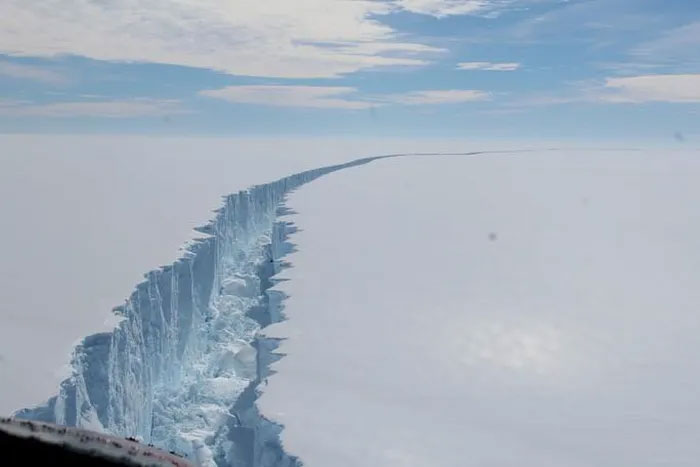Appears a 'sky river' capable of 'breaking' a continent
The atmospheric river, also known by scientists as the heavenly river, is actually a terrifying phenomenon that threatens to collapse the largest ice shelf on the Antarctic Peninsula.
The study, just published in Nature Communications Earth & Environment, used algorithms, climate models and satellite observation data to determine that 60 percent of iceberg events break off the ice shelf or glacier from 2000 to 2020 is due to atmospheric rivers.
The international work, led by Dr. Jonathan Wille from the University of Grenoble Alpes (France), said that the "sky river" is a long stream of moisture that transports warm air and water vapor from the tropics to other regions. on the earth.
Once inland, they shed rain and snow, and at the same time cause extreme temperatures above the current temperature of the icy regions, fiercely melting the surface of the ice.

The largest remaining ice shelf in the Antarctic Peninsula Larsen C - (Image: ESA).
Citing research, CNN reported that recent atmospheric river activity has destabilized the ice shelves on the Antarctic peninsula, "breaking" this icy continent piece by piece from small ice sheets to large ice sheets. as big as a state in the United States.
The effects of the "sky rivers" are consistent with conditions observed during the collapse of the Larsen A and B ice shelves, which were broken off from Antarctica in 1995 and 2002 respectively.
If an even warmer Earth's climate causes rivers of the atmosphere to be denser and more intense, the largest remaining ice shelf, Larsen C, is also at risk of total collapse.
If Larsen C collapses, it will be bad news for sea levels around the planet. The ocean will swell, and many existing lands will be submerged.
Scientists have yet to definitively confirm the relationship between "sky rivers" and climate change, but study-type observations indicate that at times when atmospheric rivers occur, Antarctica also suffer from heat waves and extreme weather conditions due to climate change.
While the frequency of future atmospheric rivers may be unknown, Dr Wille believes they will at least become more intense and more destabilizing.
Meteorologist John Turner from the British Antarctic Survey, who was not involved in the study, said science should focus on fundamental melting rather than atmospheric rivers. He attributed the destabilization of the ice shelf to fundamental melting, and that fundamental melting already has strong evidence of a link to climate change.
- Find the 'lost' ancient continent ... located below Europe
- Viruses are capable of breaking down power plants and oil refining systems
- The mysterious continent of Zealandia is transformed by the Pacific Ring of Fire
- Explore the 5 million km2 continent submerged under the Pacific Ocean
- Confluent rivers are not suitable for color matching
- The culprit makes the Red River
- Discovering traces of the ancient Antarctic continent
- Amazon River 11 million years old
- Video: Explain the sound when breaking the knuckle joint
- Super-continental plant evidence found
- Unknown continent revealed between Europe, Asia, Africa
- The Pacific subcontinent connects Australia and Antarctica
 Is the magnetic North Pole shift dangerous to humanity?
Is the magnetic North Pole shift dangerous to humanity? Washington legalizes the recycling of human bodies into fertilizer
Washington legalizes the recycling of human bodies into fertilizer Lightning stone - the mysterious guest
Lightning stone - the mysterious guest Stunned by the mysterious sunset, strange appearance
Stunned by the mysterious sunset, strange appearance